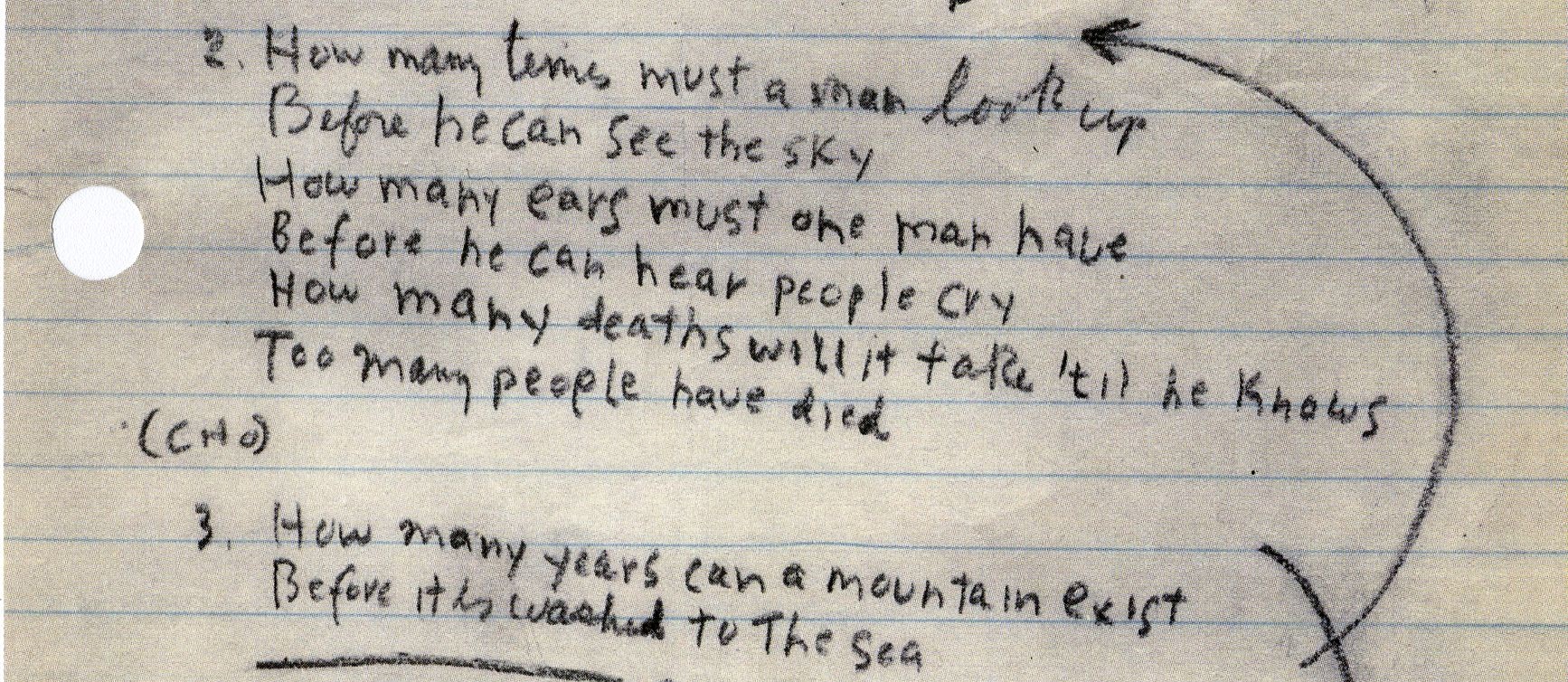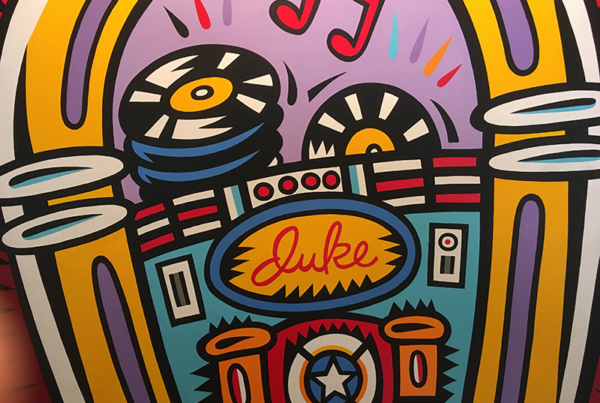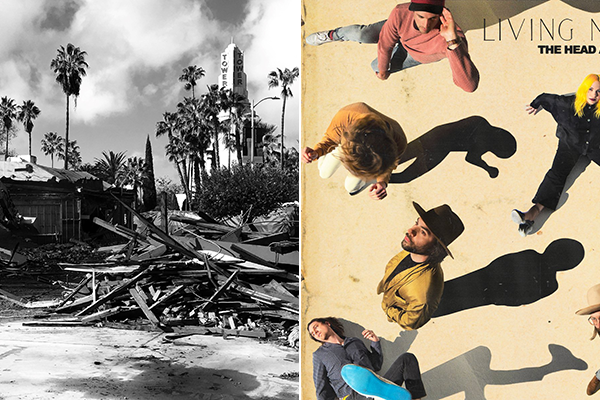
Say songwriters are not poets and you’ll get little pushback. Of course Leonard Cohen, Bob Dylan, Joni Mitchell and Lennon/McCartney and a few others have earned critical acclaim for “creating poetry.” But, while great lyrics help make overall great music, only rarely do the words, independent of the complete track, express something truly profound.
When it does happen, hallelujah. So here’s a shout out to some great songs and their lyricists whose compositions invoke inspiration, clarity, hope, loss, sympathy or other truly poetical responses.
Sometimes it’s as simple as a word choice.
- With “Linger” by The Cranberries (lyricists Dolores O’Riordan and Noel Hogan) rely on a single word to tell a beguiling story of trust, broken but not gone. (Was it just a game to you? / But I’m in so deep
You know I’m such a fool for you / You got me wrapped around your finger / Do you have to let it linger?)
- “Wonderwall” by Oasis brother Noel Gallagher explains the one-word title in the chorus, (Because maybe / You’re gonna be the one who saves me? / And after all / You’re my wonderwall.)
- There is a book written about Leonard Cohen’s omnipresent masterwork, “Hallelujah.” Though its expansive verses and obtuse lyrics are subject to much interpretation, the repeating chorus of “Hallelujah” is universally relatable.
Sometimes it’s a phrase or verse, frequently the chorus, but occasionally a single hook, humbly placed, with little fanfare.
- A number of Joni Mitchell’s endearing songs of life have withstood the test of time: (I’ve looked at life from …) “Both Sides Now” and (We’re captive on the carousel of time … And go round and round and round in …) “The Circle Game.”
- John Sebastian’s “Darlin’ Be Home Soon” from 1967 seems quaint by today’s standards, but the sentiment is as sublime as anything since: My darling be home soon / It’s not just these few hours, but I’ve been waiting since I toddled / For the great relief of having you to talk to.
- Better than any, the titles of Paul Simon’s “Sound of Silence” and “Bridge Over Troubled Waters” stimulate both aural and visual sensations.
- Fred Neil’s introspective “Everybody’s Talkin'” (… at me, I can’t hear a word they’re sayin,’ only the echoes of my mind) is more relevant than ever in these constantly distracting times.
- In the raw “Car Wheels on a Gravel Road,” Lucinda Williams artistically blends memories and metaphor (Lookin’ out the window / Little bit of dirt mixed with tears).
- There’s an abundance of emotive lyrics that plumb the depths of heartbreak and lost love: In the melancholy “Most of Time,” Bob Dylan used misdirection to express his mixed feelings: She ain’t even in my mind / I wouldn’t know her if I saw her / She’s that far behind / Most of the time.
More examples: The prolific Ryan Adams’ “Cry on Demand” (… just close my eyes and think of you); Peter Gabriel’s “In Your Eyes” (…I feel complete); Beth Orton’s sorrowful “I Wish I Never Saw the Sunshine” (You took the blue out of the sky / My whole life changed when you said goodbye); sixties troubadour Donovan’s (I may as well try and …) “Catch the Wind”; and most poignant of all, Ty Hardin’s “Reason to Believe” (Knowing that you lied straight-faced while I cried / Still, I look to find a reason to believe).
Rarer still is when the entirety of a song’s lyrics elicits the sort of awe or ahh, for that matter, that makes listeners feel, perhaps even move them to pull up online or pull out the album’s liner notes.
- Mortality and unconditional love intersect in two beautiful songs. In “If I Should Fall Behind” Bruce Springsteen writes, We said we’d walk together baby come what may / That come the twilight should we lose our way / If as walking a hand should slip free / I’ll wait for you / And should I fall behind / Wait for me. Newest Americana music favorite Zach Bryan’s “Billy Stay” delivers on the theme more literally but equally as exquisitely: Billy stay awhile / Lately you’ve been slipping in and out // If love was enough then you’d stay forever / But I guess sometimes that the end is better.
- Another Springsteen masterpiece, “The Rising,” is a prayerful homage to the 9-11 attack’s first-responders. His lyrics paint a devastating final thought of one doomed firefighter: I see you Mary in the garden // May I feel your arms around me / May I feel your blood mix with mine / A dream of life comes to me / Like a catfish dancin’ on the end of my line.
- Otis Redding’s “(Sittin’ On) The Dock of the Bay” literally and figuratively evokes the universal condition of hopelessness and despair. Sittin’ here restin’ my bones / And this loneliness won’t leave me alone, listen / Two thousand miles, I roam / Just to make this dock my home.
- Joe South’s 1969 chart topper “Walk a Mile in My Shoes” literally and figuratively defines empathy: If you could see you through my eyes / Instead of your ego / I believe you’d be / Surprised to see / That you’ve been blind // And before you abuse, criticize and accuse / Walk a mile in my shoes.
- A contemporary take on the mile-walk, “Comeback Story,” written collectively by Kings of Leon, lays bare the line, Trying my best hoping that you’ll see // I walked a mile in your shoes / And now I’m a mile away and I’ve got your shoes.
Admittedly, these examples are disproportionately dated. There aren’t too many contemporary artists, however, who claim or care to be considered poetic.
To fully appreciate each of these songs and other personal favorites, simply Google the full lyrics. And as always, please comment on what’s right or wrong with this essay.






Its always striking how much more powerful the words feel to me when written, as opposed to heard. I am not a frequent music listener but really appreciate the quality of exceptional lyrics. The same is true with oratory. I am always struck by the immense power and beauty of Martin Luther King’s writing, as opposed to the rising and falling cadences of his preaching-style speech, which I find distracting. But as words on paper, it is mighty, transformative poetry.